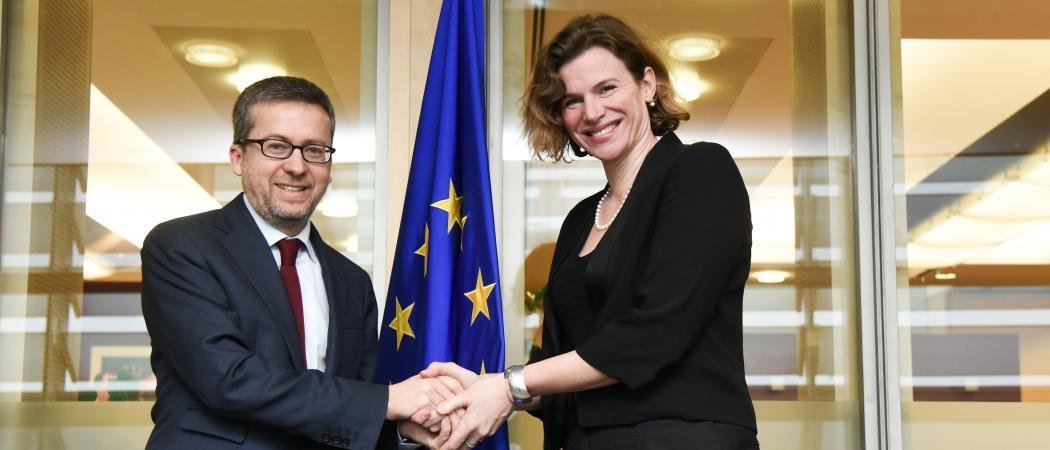A total of 75 successful applicants, divided equally among five themes, will be responsible for designing and managing the missions

EU research commissioner Carlos Moedas recruited UCL economist Mariana Mazzucato to advise on how to create research missions in Horizon Europe. Photo: European Commission
The European Commission put out a call on 13 May for applications to join the advisory boards of the new research missions that are to be set up under Horizon Europe, the proposed €94.1 billion research programme.
There is one call for five boards, corresponding to the five broad themes or “mission areas”, but applicants can express a preference as to which board they would like to join if selected. There will be a 15-member board for each mission area. The deadline for applications is midday on 11 June.
The boards will advise the Commission on the design and management of each of the missions, which will have specific goals, such as improving cancer treatment and protecting soil health.
Designing missions
While the boards will design the missions, their role is advisory in that the plans must be approved by a programme committee of national representatives and formally adopted by the Commission.
The call says that in principle each board will meet at least four times per year, and each meeting will last about a day and a half. Board members will be expected to work about 15-20 days per year, and chairs around 25 days.
Policymakers have already agreed the five themes for the missions, of adapting to climate change; cancer; healthy oceans, seas, coastal and inland waters; smart, climate-neutral cities; and soil health and food.
The Horizon Europe legislation says board members need to be “high level individuals” and will include representatives of end users in the institutions and companies that will carry out the research. The call itself goes into a little more detail, saying that the Commission hopes to recruit people with experience in a variety of areas, including industries relevant to the mission areas, academia and research institutes; policymakers; former public figures, such as city mayors; and people from international agencies, civil society organisations, and non-governmental organisations.
No budget clarity
While Horizon Europe’s structure is fairly clear, where the missions will fit in the budget proposed by the Commission is not. The Commission has said missions should get between €5 billion and €10 billion, but the final figure will not be settled until member states reach an agreement on the EU’s next long term financial plan, which is unlikely to happen before the end of the year.
A deal between the Council and the European Parliament does say that for the first three years of Horizon Europe’s seven-year lifespan, the budget for the missions should be no more than ten per cent of the programme’s second pillar in “global challenges and industrial competitiveness.”
In the Commission’s proposal, pillar II is worth €52.7 billion. However, as things stand, all of that is accounted for by other items, none of which have a clear link to the missions, and the pillar II budget is not in the inter-institutional agreement on Horizon Europe, even as a percentage of total spend.





 A unique international forum for public research organisations and companies to connect their external engagement with strategic interests around their R&D system.
A unique international forum for public research organisations and companies to connect their external engagement with strategic interests around their R&D system.